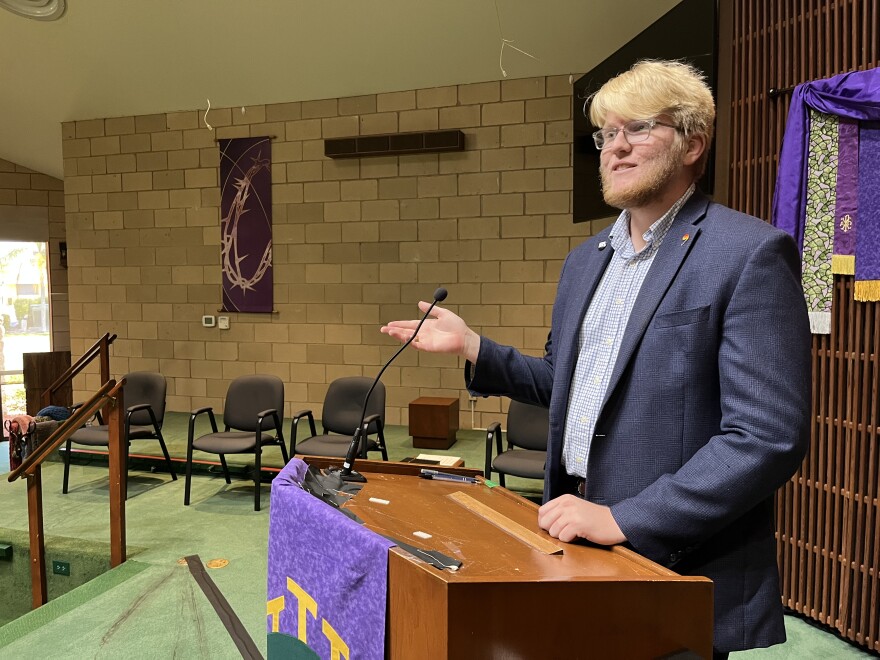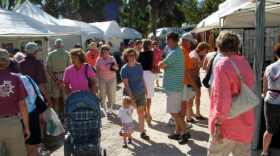Eloise Pennington was raised Catholic and has always had a strong relationship with God, but when she came out as gay, she knew the church would not accept her.
“We're still not really accepted in the Catholic Church,” Pennington said. “I can't imagine that they would welcome us, you know, two women walking in holding hands and me introducing Rose as my wife.”
Religion remains an important part of Pennington’s life, so after she married her wife, the pair began attending St. John the Apostle. Pennington and her wife have been members of the LGBTQ+ friendly Metropolitan Community Church’s congregation for 15 years. Pennington said she has spoken to many other gay people there who report being turned away by other churches.
“When you talk to people at MCC you hear over and over again, “Oh, I grew up Catholic, but the Catholic Church doesn't accept us,” she said. Times have changed, and these days fewer churches may turn away gay couples, but for Pennington tolerance is not the same as total acceptance. “You're supposed to go to church and know God is within you and you’re accepted by God,” she said. “But I know I didn't feel that way in any Catholic Church.”
There has always been a complicated relationship between religion and queerness. Churches like St. John the Apostle are making a concerted effort to bring LGBTQ+ people back into the fold. According to its website, the church is dedicated to becoming a non-judgmental, accepting fellowship that follows the example and teaching of Jesus. The church moves toward this goal by maintaining a safe environment where LGBTQ and all other marginalized people are accepted as they are.
When St. John the Apostle was founded in 1997, the church was unique in its mission, but today it is one of many. Another local church that is making this effort to bring in LGBTQ+ people is the Fort Myers Congregational United Church of Christ, where Brooks Applegate is a community minister. Applegate said his church is open and affirming and has made a public covenant to welcome persons of all sexual orientations, gender identities, and gender expressions.
"I think the legacy of religion, especially Christianity, is the persecution of the queer community,” he said. “I think it's especially important to heal the wounds that have been left there to fester by religious communities in the past.” Applegate said he sees this work as a part of the mission that Christ calls him to do. While the church lost some members when they adopted the new distinction, they haven’t faced much backlash since. Their pride flag has been torn down on a few occasions and they’ve dealt with some protesters, but the response has been largely positive.
“Those within the queer community have been so persecuted in the past as a part of our denomination, the UCC,” he said. “So, I see it just as doing the work of justice. Christ calls us to accept our queer brothers and sisters.” Acceptance of gay people is a major first step for churches, but Pennington said she doesn’t think they should stop there. She attends church less now than she used to, in part because she felt her congregation wasn't moving forward anymore.
“Gay people became more accepted in the past 15 years,” she said “They could almost go to any church. So the need wasn't quite as strong as it used to be, many, many years ago, when there was the only place that gay people were welcome.”
Transgender people especially have not seen the same level of acceptance, according to Pennington. And with anti-transgender legislation popping up all across the country, addressing issues like childhood transition, gendered bathrooms and transgender participation in sports, this lack of acceptance seems to hold true.
Young LGBTQ+ people are another demographic that churches have failed to reach, according to Pennington. She said she believes that a person’s faith grows stronger as they age, but that everyone can benefit from the sense of community that church attendance can provide. “When the pastor does a sermon about how wonderful it is to be accepted by God, you just open your heart,” she said. “He accepts you just the way you are. We are in His image.”
She always feels better on Sundays after returning home from the morning service. Praying with others is like a booster shot for her.
“There's a wonderful, wonderful feeling about praying with other people,” she said. “Faith is personal, but it's nice to share it with other people.”
For Applegate the church’s acceptance of the queer community is a principle that ties back to scripture, and one of the few descriptions of God in the Bible.
“God is love,” he said. “God loves everyone, regardless of who you decide to love.”




